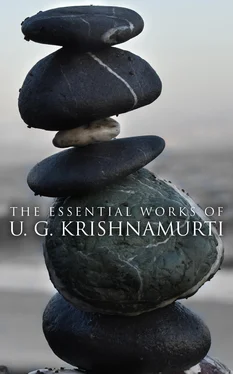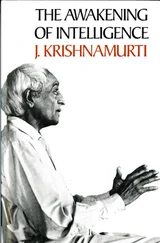U. Krishnamurti - The Essential Works of U. G. Krishnamurti
Здесь есть возможность читать онлайн «U. Krishnamurti - The Essential Works of U. G. Krishnamurti» — ознакомительный отрывок электронной книги совершенно бесплатно, а после прочтения отрывка купить полную версию. В некоторых случаях можно слушать аудио, скачать через торрент в формате fb2 и присутствует краткое содержание. Жанр: unrecognised, на английском языке. Описание произведения, (предисловие) а так же отзывы посетителей доступны на портале библиотеки ЛибКат.
- Название:The Essential Works of U. G. Krishnamurti
- Автор:
- Жанр:
- Год:неизвестен
- ISBN:нет данных
- Рейтинг книги:5 / 5. Голосов: 1
-
Избранное:Добавить в избранное
- Отзывы:
-
Ваша оценка:
- 100
- 1
- 2
- 3
- 4
- 5
The Essential Works of U. G. Krishnamurti: краткое содержание, описание и аннотация
Предлагаем к чтению аннотацию, описание, краткое содержание или предисловие (зависит от того, что написал сам автор книги «The Essential Works of U. G. Krishnamurti»). Если вы не нашли необходимую информацию о книге — напишите в комментариях, мы постараемся отыскать её.
Content:
The Mystique of Enlightenment
Courage to Stand Alone
Mind is a Myth
No Way Out
Thought is Your Enemy
The Natural State
The Essential Works of U. G. Krishnamurti — читать онлайн ознакомительный отрывок
Ниже представлен текст книги, разбитый по страницам. Система сохранения места последней прочитанной страницы, позволяет с удобством читать онлайн бесплатно книгу «The Essential Works of U. G. Krishnamurti», без необходимости каждый раз заново искать на чём Вы остановились. Поставьте закладку, и сможете в любой момент перейти на страницу, на которой закончили чтение.
Интервал:
Закладка:
_______________
Do you listen to anybody? You do not; you listen only to yourself. When you leave the sense of hearing alone, all that is there is the vibration of the sound — the words repeat themselves inside of you, as in an echo chamber. This sense is functioning in just the same way with you, except that you think the words you are hearing come from outside of you. Get this straight: You can never hear one word from anyone else, no matter how intimately you think you are in relationship with that person; you hear only your own translations, always. They are all your words you are hearing. All that the other person's words can possibly be to you is a noise, a vibration picked up by the ear-drum and transferred to the nerves which run to the brain. You are translating those vibrations all the time, trying to understand, because you want to get something out of what you are hearing. That is all right for a relationship with someone on the level of "Here is some money; give me a half kilo of carrots" — but that is the limit of your relationship, of your communication, with anybody.
When there is no translation, all languages sound the same whether or not your particular knowledge structure 'speaks' a particular language. The only differences are in the spacing of the syllables and in the tune. Languages are melodic in different ways.
It is acquired taste that tells you that Beethoven's Ninth Symphony is more beautiful than a chorus of cats screaming; both produce equally valid sensations. Of course some sounds can be damaging to the body, and noise levels above a certain number of decibels are hard on the nervous system and can cause deafness — that is not what I am talking about. But the appreciation of music, poetry and language is all culturally determined and is the product of thought.
______________
Your movement of thought interferes with the process of touch, just as it does with the other senses. Anything you touch is always translated as 'hard', 'soft', 'warm', 'cold', 'wet', 'dry', and so on.
You do not realize it, but it is your thinking that creates your own body. Without this thought process there is no body consciousness — which is to say there is no body at all. My body exists for other people; it does not exist for me; there are only isolated points of contact, impulses of touch which are not tied together by thought. So the body is not different from the objects around it; it is a set of sensations like any others. Your body does not belong to you.
Perhaps I can give you the 'feel' of this. I sleep four hours at night, no matter what time I go to bed. Then I lie in bed until morning fully awake. I don't know what is lying there in the bed; I don't know whether I'm lying on my left side or my right side — for hours and hours I lie like this. If there is any noise outside — a bird or something — it just echoes in me. I listen to the "flub-dub-flub-dub" of my heart and don't know what it is. There is no body between the two sheets — the form of the body is not there. If the question is asked, "What is in there?" there is only an awareness of the points of contact, where the body is in contact with the bed and the sheets, and where it is in contact with itself, at the crossing of the legs, for example. There are only the sensations of touch from these points of contact, and the rest of the body is not there. There is some kind of heaviness, probably the gravitational pull, something very vague. There is nothing inside which links up these things. Even if the eyes are open and looking at the whole body, there are still only the points of contact, and they have no connection with what I am looking at. If I want to try to link up these points of contact into the shape of my own body, probably I will succeed, but by the time it is completed the body is back in the same situation of different points of contact. The linkage cannot stay. It is the same sort of thing when I'm sitting or standing. There is no body.
Can you tell me how mango juice tastes? I can't. You also cannot; but you try to relive the memory of mango juice now — you create for yourself some kind of an experience of how it tastes — which I cannot do. I must have mango juice on my tongue — seeing or smelling it is not enough — in order to be able to bring that past knowledge into operation and to say "Yes, this is what mango juice tastes like." This does not mean that personal preferences and 'tastes' change. In a market my hand automatically reaches out for the same items that I have liked all my life. But because I cannot conjure up a mental experience, there can be no craving for foods which are not there.
Smell plays a greater part in your daily life than does taste. The olfactory organs are constantly open to odors. But if you do not interfere with the sense of smell, what is there is only an irritation in the nose. It makes no difference whether you are smelling cow dung or an expensive French perfume — you rub the nose and move on.
________________
My talking comes out in response to the questions which are asked. I cannot sit and give a talk on the natural state — that is an artificial situation for me. There is nobody who is thinking thoughts and then coming out with answers. When you throw a ball at me, the ball bounces back, and that is what you call an 'answer'. But I don't give any answers; this state is expressing itself. I really don't know what I'm saying, and what I'm saying is of no importance. You may transcribe my own talking, but it will make no sense to me — it is a dead thing.
What is here, this natural state, is a living thing. It cannot be captured by me, let alone by you. It's like a flower. (This simile is all I can give.) It just blooms. It's there. As long as it is there, it has a fragrance which is different and distinct from that of every other flower. You may not recognize it. You may or may not write odes or sonnets about it. A wandering cow might eat it, or it may be chopped down by a haycutter, or it fades and is finished — that's the end of it. It's of no importance. You can't preserve its perfume; whatever you preserve of this is only a synthetic, a chemical perfume, not the living thing. Preserving the expressions, teachings or words of such a man has no meaning. This state has only contemporary value, contemporary expression.
_________________
The personality does not change when you come into this state. You are, after all, a computer machine, which reacts as it has been programmed. It is in fact your present effort to change yourself that is taking you away from yourself and keeping you from functioning in the natural way. The personality will remain the same. Don't expect such a man to become free from anger or idiosyncrasies. Don't expect some kind of spiritual humility. Such a man may be the most arrogant person you have ever met, because he is touching life at a unique place where no man has touched before.
It is for this reason that each person who comes into this state expresses it in a unique way, in terms relevant to his time. It is also for this reason that if two or more people are living in this state at the same time, they will never get together. They won't dance in the streets hand in hand: "We are all self-realized men! We belong!"
_________________
The natural needs of a human being are basic: food, clothing and shelter. You must either work for them or be given them by somebody. If these are your only needs, they are not very difficult to fulfill. To deny yourself the basic needs is not a sign of spirituality; but to require more than food, clothing and shelter is a neurotic state of mind.
Is not sex a basic human requirement? Sex is dependent upon thought; the body itself has no sex. Only the genitals and perhaps the hormone balances differ between male and female. It is thought that says "I am a man, and that is a woman, an attractive woman." It is thought that translates sex feelings in the body and says "These are sexual feelings." And it is thought that provides the build-up without which no sex is possible: "It would be more pleasurable to hold that woman's hand than just to look at her. It would be more pleasurable to kiss her than just to embrace her," and so on. In the natural state there is no build-up of thought. Without that build-up, sex is impossible. And sex is tremendously violent to the body. The body normally is a very peaceful organism, and then you subject it to this tremendous tension and release, which feels pleasurable to you. Actually it is painful to the body.
Читать дальшеИнтервал:
Закладка:
Похожие книги на «The Essential Works of U. G. Krishnamurti»
Представляем Вашему вниманию похожие книги на «The Essential Works of U. G. Krishnamurti» списком для выбора. Мы отобрали схожую по названию и смыслу литературу в надежде предоставить читателям больше вариантов отыскать новые, интересные, ещё непрочитанные произведения.
Обсуждение, отзывы о книге «The Essential Works of U. G. Krishnamurti» и просто собственные мнения читателей. Оставьте ваши комментарии, напишите, что Вы думаете о произведении, его смысле или главных героях. Укажите что конкретно понравилось, а что нет, и почему Вы так считаете.












